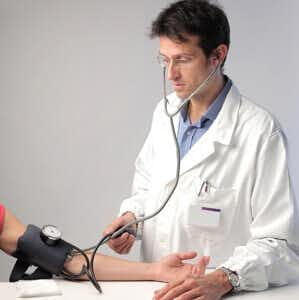
Do you know your blood pressure measurement? It is just as important to your heart health as your cholesterol level, and even easier to track. All you need is a home blood pressure monitor. If you find your blood pressure is quite a bit lower when you take it at home than when it is measured at the doctor’s office, you might have white coat hypertension.
What Is White Coat Hypertension?
Q. My blood pressure at home is normal without medication (110/68). I take it with a BP machine checked by a cardiologist.
In a medical setting, it’s sky high and doctors get upset. I have been prescribed medication for blood pressure, but it doesn’t keep my pressure down at the doctor’s. No heart or artery disease has been found.
I am 65 and this has been happening since I was in my early 30s. At the doctor’s office I feel panic. Any suggestions?
A. You describe “white coat hypertension” perfectly. Many people react as you do with panic and high blood pressure in a medical setting.
Keeping a diary of your home pressure readings may help. You will find more information on white coat hypertension and non-drug approaches in the Guide to Blood Pressure Treatment we are sending.
When Home and Office Blood Pressure Readings Clash
Doctors have long debated how vigorously white coat hypertension should be treated. Some recognize that during much of a normal day, the patient’s blood pressure is quite normal, and don’t worry too much about the elevation that shows up in medical settings.
Others argue that blood pressure rising under stress puts the patient at risk. They prefer to treat with enough medication to keep blood pressure from becoming too high even in the doctor’s office.
A study that followed 6,458 people for more than eight years found that untreated white coat hypertension carries some risk, but blood pressure that is high both at home and in the office is the most dangerous (Stergiou et al, Hypertension, April 2014).
Masked hypertension, in which blood pressure runs higher at home than at the doctor’s office, presents more of a risk of cardiovascular complications than white coat hypertension does (American Journal of Hypertension, online Nov. 14, 2014). Women are more prone to white coat hypertension, while men appear more susceptible to masked hypertension (Sheppard et al, American Journal of Hypertension, May, 2016).
Getting Your Blood Pressure Under Control:
You will find some helpful hints in our review on blood pressure. Besides antihypertensive medications, you can learn to slow your breathing, meditate, exercise regularly and follow a DASH diet. Any of these approaches can help you reduce your blood pressure and your risk of a heart attack.
Revised 6/19/17
Redirected 7/21/19 to: https://www.peoplespharmacy.com/articles/do-you-really-have-high-blood-pressure/

